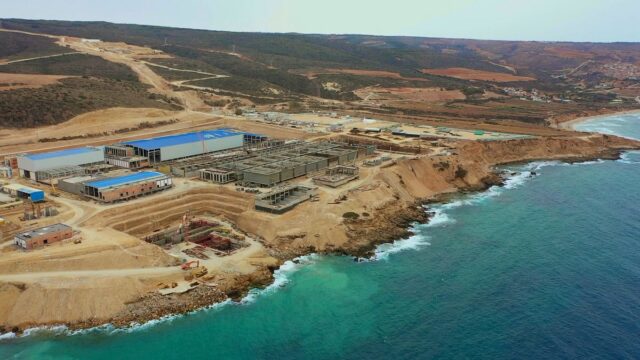One of the biggest challenges facing Algeria is its drinking water supply. To respond to this emergency, the State is innovating by investing in desalination and wastewater recycling.
Algeria faces one of its greatest challenges: the supply of drinking water. To address this growing water shortage, the State has implemented innovative solutions by carrying out ambitious projects aimed at guaranteeing access to drinking water for the Algerian population.
West of Oran, the Cap Blanc seawater mega desalination plant represents a strategic investment. Oran currently has three stations, but it is still insufficient to cover the needs of a population of 2.5 million inhabitants, without forgetting the industrial sector. The Cap Blanc project, whose construction is being carried out “on a fast track”, will strengthen the drinking water supply of Oran and other wilayas (provinces) in the west. Scheduled to be operational in December 2024, this infrastructure will be put into service only 25 months after the start of works.
Mouloud Hachlaf, communications director of the AEC, underlines the importance of this initiative: “We anticipated the drought with a first program that implemented 14 stations that produce 2.2 million m³ per day, that is, 18% of the water drinking water for citizens. By 2050, the Sahel, which includes Algeria, will lose 20% of its rainfall. Therefore, we are developing a complementary program to increase our drinking water desalination capacity from 18% to 42%.”
Seawater desalination is often criticized for its cost and environmental impact. Algeria is aware of this and is committed to reducing this impact by integrating an energy mix into its stations, including solar panels, to make these infrastructures more environmentally friendly.
Other similar projects are also underway, such as the Mostaganem station, inaugurated in 2011, which produces 200,000 m³ of drinking water per day. Another new plant is planned at Khadra, 72 km east of Mostaganem, which is expected to produce 300,000 m³ of drinking water per day while providing protection against rising sea levels.
Farouk Elbrouz, technical director of STMM, explains: “We can control all phases of water treatment and carry out regular analyzes to ensure that this water meets Algerian and WHO standards.”
However, desalination alone will not be enough to cover all of Algeria’s drinking water needs. The country is also seeking to strengthen its supply by reusing treated wastewater, as demonstrated by the example of Médéa. In this region located 90 kilometers from the capital, Algiers, fruit farms use purified water for irrigation, which makes it possible to cope with years of drought.
Abdelkader Benkorbi, an agronomist, says: “We were forced to look for water, and water from the treatment plant was our only solution.”
Algeria is committed to seawater desalination to cover 60% of its population’s water needs by 2030. Together with innovative wastewater treatment technologies, this strategic plan aims to forge a more stable future in the face of future climate challenges.







